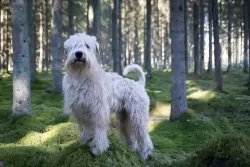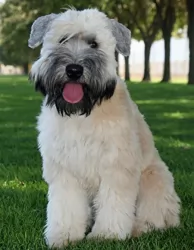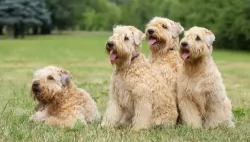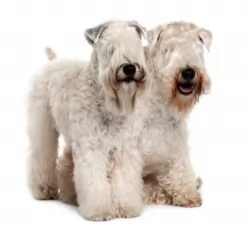 MyDogBreeds
MyDogBreeds Soft-Coated Wheaten Terrier is originated from United Kingdom but Bernedoodle is originated from Canada. Soft-Coated Wheaten Terrier may grow 7 cm / 3 inches higher than Bernedoodle. Soft-Coated Wheaten Terrier may weigh 21 kg / 46 pounds lesser than Bernedoodle. Both Soft-Coated Wheaten Terrier and Bernedoodle has same life span. Both Soft-Coated Wheaten Terrier and Bernedoodle has almost same litter size. Both Soft-Coated Wheaten Terrier and Bernedoodle requires Moderate maintenance.
Soft-Coated Wheaten Terrier is originated from United Kingdom but Bernedoodle is originated from Canada. Soft-Coated Wheaten Terrier may grow 7 cm / 3 inches higher than Bernedoodle. Soft-Coated Wheaten Terrier may weigh 21 kg / 46 pounds lesser than Bernedoodle. Both Soft-Coated Wheaten Terrier and Bernedoodle has same life span. Both Soft-Coated Wheaten Terrier and Bernedoodle has almost same litter size. Both Soft-Coated Wheaten Terrier and Bernedoodle requires Moderate maintenance.
 This wheaten colored terrier hails from Ireland. Although the Wheaten has been around for a long time, it was in 1937 that he was recognized as a breed in Ireland.
This wheaten colored terrier hails from Ireland. Although the Wheaten has been around for a long time, it was in 1937 that he was recognized as a breed in Ireland.
The British Kennel Club also recognized the Wheaten and the dog was also exported to the United States. Serious interest started being shown for the Terrier in the 1970s. It was in 1973 that they were recognised by the American Kennel Club.
 The Bernedoodle is a hybrid cross between the Bernese Mountain Dog and the Standard Poodle. They have been around for many, many years but the first official” cross between the two breeds came from Sherry Rupke out of SwissRidge Kennels. The first Bernedoodle were achieved in 2003. She now has an entire breeding program for this hybrid.
The Bernedoodle is a hybrid cross between the Bernese Mountain Dog and the Standard Poodle. They have been around for many, many years but the first official” cross between the two breeds came from Sherry Rupke out of SwissRidge Kennels. The first Bernedoodle were achieved in 2003. She now has an entire breeding program for this hybrid.
A bernedoodle or a first generation is a cross between a purebred a purebred Poodle and a purebred Bernese Mountain Dog. This is a 50/50 mix. This mix is a very low shedding dog and though no dog is hypoallergenic, the Bernedoodle is as close as it gets. If the cross is true between two purebred dogs, the new breed will have the calm, sweet demeanor of the Bernese Mountain Dog and the intelligent, goofy, playfulness of the Poodle. At the same time the Bernedoodle is a hybrid so there will not be two exactly alike.
With purebred dogs you get a lot of consistency from one dog to another. Not so with the Bernedoodle. Each one will be a little different. Sometimes a hybrid dog can be healthier than their parents. Other times there can be health issues with hybrid. It is all about the breeder and if they breed for the right health traits.
If the breeder is conscientious enough the pup will have the best characteristics of both original breeds. Therefore, the Bernedoodle is happy, smart, playful, friendly and social. Sometimes the breeding doesn’t go as planned and you can end up with a Bernedoodle with the stubbornness of the Bernese or the hyper activity of the poodle. As a new cross breed, the Bernedoodle is not recognized by the American Kennel Club because it is a hybrid. They are recognized by the International Designer Canine Registry, The American Canine Hybrid Club, The Designer Dogs Kennel Club.
 The Wheaten is a medium sized dog standing at between 43 and 50cm and weighing between 13 and 20kg both male and female. The coat of the dog is soft, silky and wavy to even curly and is a wheaten to ginger color.
The Wheaten is a medium sized dog standing at between 43 and 50cm and weighing between 13 and 20kg both male and female. The coat of the dog is soft, silky and wavy to even curly and is a wheaten to ginger color.
The coat of the puppy is dark but as he grows up it changes into the wheaten color although the ears may be a dark brown color. Pet owners like that the Wheaten is a very low shedding dog.
Playful, social and friendly, the Wheaten has always been put to good use on the farm. These days he is pet and companion. He is energetic and playful so children love having him around.
He is slightly more hyper and energetic than other Terrier breeds so will require a good dose of exercise.
He is smart and strong willed, and training and socialization turns him into an amicable pet to have around, so much so that he is sought after as a therapy-dog.
They’re easy-going dogs with no aggression issues but they still make great watch dogs and want to do whatever it takes to look after- and protect their human family.
 Since the Bernedoodle is a hybrid and not an AKC recognized breed, there is no set-in stone breed standard. There are three sizes of Bernedoodles and at least three generations. All of these should be strong boned dogs with powerful and compact bodies. They have log ears, button eyes and a triangle shaped muzzle. The tail is long and bushy, and the coat is medium to long.
Since the Bernedoodle is a hybrid and not an AKC recognized breed, there is no set-in stone breed standard. There are three sizes of Bernedoodles and at least three generations. All of these should be strong boned dogs with powerful and compact bodies. They have log ears, button eyes and a triangle shaped muzzle. The tail is long and bushy, and the coat is medium to long.
There is no standard color, but the most common color is black and white or tri like the Bernese Mountain Dog. They can also be black and brown, sable or merle. The coat is wavy or curly like the poodle.
 The Soft Coated Wheaten Terrier has always made an excellent farm dog, but today he is more suited as pet and companion.
The Soft Coated Wheaten Terrier has always made an excellent farm dog, but today he is more suited as pet and companion.
He adapts easily to life in the city or the countryside. Wherever he is, he will need his exercise. He also longs to be an active part of his human family, and then he’s happy, lively, social and friendly and is a great playmate for children.
 This is a very social dog that needs to be with people. If you don’t have a lot of time for a dog, then this is not the one for you. He is gentle, calm and affectionate. He is intelligent and sometimes stubborn. They need to be socialized early in life and they will be great with kids and other small animals. They tend to be very playful. Toys and minis have more energy, more stubbornness and more of the poodle divaness.
This is a very social dog that needs to be with people. If you don’t have a lot of time for a dog, then this is not the one for you. He is gentle, calm and affectionate. He is intelligent and sometimes stubborn. They need to be socialized early in life and they will be great with kids and other small animals. They tend to be very playful. Toys and minis have more energy, more stubbornness and more of the poodle divaness.
 When you bring a Wheaten Terrier into your home, you’re not likely to have too many vet fees as he tends to be a healthy dog breed, being able to reach 13, 14 or 15 years of age with good care.
When you bring a Wheaten Terrier into your home, you’re not likely to have too many vet fees as he tends to be a healthy dog breed, being able to reach 13, 14 or 15 years of age with good care.
Look out for a dog ailment known as Protein-losing enteropathy (PLE). This is a condition where the dog isn’t able to properly absorb protein in the digestive tract, so that it is passed in their stools.
It can be fatal, but if caught early, some dietary changes can keep it under control.
Also, look out for inflammatory bowel disease. This disease occurs when the stomach of the dog has a large number of inflammatory cells which can change the lining of the digestive tract, preventing the normal absorption of food.
 Because the breed is so new and bred pure so far, there is not a lot of information about their health or their life span. Even as they seem to have less issues than their parents – the Bernese cancer issue for example does not seem to plague the Bernedoodle. However, that does not mean they don’t have issues. They are still prone to some serious issues.
Because the breed is so new and bred pure so far, there is not a lot of information about their health or their life span. Even as they seem to have less issues than their parents – the Bernese cancer issue for example does not seem to plague the Bernedoodle. However, that does not mean they don’t have issues. They are still prone to some serious issues.
Skin issues, hip and elbow dysplasia, and eye issues are prevalent in this new breed. They have a tendency toward hot spots and sometimes allergies. Asks a reputable breeder if they have tested the parents and the puppies for dysplasia and eye issues.
 Brush your pet’s silky coat twice a week. Such a silky coat can get all tangled and matted. If you prefer, many people opt to rather have the Wheaten’s coat professionally clipped as then it is easier to handle. They like to have the hair clipped that hangs over the dog’s eyes.
Brush your pet’s silky coat twice a week. Such a silky coat can get all tangled and matted. If you prefer, many people opt to rather have the Wheaten’s coat professionally clipped as then it is easier to handle. They like to have the hair clipped that hangs over the dog’s eyes.
Other grooming tasks require you to check inside his ears for redness which could indicate an infection. Trim his nails and check him over for ticks and fleas.
Have your Wheatie trained and socialized as he is a stubborn dog breed and you want him to be well mannered and obedient.
Terriers like this are energetic dogs and he is going to need exercise every day. A walk for a dog is always a welcome experience as it gives him the opportunity to sniff around and pick up new smells. Play ball- or frisbee games with him as this can tire him out a bit.
If your dog shows signs of illness, get him to the vet. He is such a feisty dog that it can be unbearable to see him out of sorts.
Terriers are energetic dogs so if you feed your dog one of the commercial dog foods, make sure the label indicates what food it is. This is because the foods are manufactured according to the type of dog it is, its age, size and energy levels.
Always try and go for the high quality foods which don’t have all those unhealthy ingredients in them. Try to include some home-made food – nothing exotic and spicy – just plain, wholesome food that won’t upset his stomach.
Boiled chicken, brown rice or pasta and spinach, sweet potatoes and carrots is super tasty and nutritious. You can chop it up and add it to your pet’s kibble twice a week.
Try and include a little bit of raw meat to his diet occasionally as this can go towards ensuring he doesn’t get skin diseases. Always ensure he has a constant supply of fresh, cool water available.
 Since the Bernedoodle comes in three different sizes, there will be three different feeding regimens. No matter the size of your dog, feed them quality food twice a day. The standard is a big dog and should be fed as such but the toy and mini will eat a lot less. You can pretty much feed a standard Bernedoodle the same thing you feed a Bernese Mountain Dog. The Bernedoodle is a picky eater and you may have to change up their food at times to keep them interested.
Since the Bernedoodle comes in three different sizes, there will be three different feeding regimens. No matter the size of your dog, feed them quality food twice a day. The standard is a big dog and should be fed as such but the toy and mini will eat a lot less. You can pretty much feed a standard Bernedoodle the same thing you feed a Bernese Mountain Dog. The Bernedoodle is a picky eater and you may have to change up their food at times to keep them interested.
Again, these are healthy dogs because the cross breed is so young. There are not a lot of genetic issues. As mentioned previously hip dysplasia, eye issues, elbow dysplasia and skin issues are possible.
This is a calm, not over active dog. They do not share the high energy level of the poodle but rather carry the calm, gentle energy of the Bernese. The toy and mini varieties tend to have a faster motor than the standard. They need daily walks no matter what their size is. They will need your attention regularly.